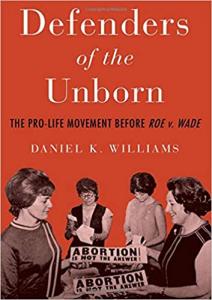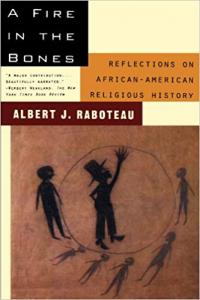Today I’m delighted to introduce the newest member of The Anxious Bench: Daniel K. Williams teaches American history at the University of West Georgia and is the author of several books on religion and politics, including The Election of the Evangelical: Jimmy Carter, Gerald Ford, and the Presidential Contest of 1976 (University Press of Kansas, 2020). For his first post, Dan considers why their view of American history helps explain why white evangelicals respond differently to the debates over abortion and racism.

This year, millions of white conservative evangelical Christians who object to enlisting the church in the political fight against racial injustice will instead enlist their churches in a political fight against another societal sin: abortion. Indeed, many of the white evangelicals who have claimed that the church does not have a responsibility to fight against societal racial injustice in the political sphere have participated in marches on behalf of unborn lives, preached against abortion from the pulpits of their churches, written letters to the editors of their local newspapers to demand an end to abortion, and made their pro-life convictions a political litmus test every time they vote. In other words, they have treated abortion exactly like many black Christians would like their white brothers and sisters to treat issues of race.
But this leads to a question: Why have those of us who are white evangelical Christians found it so easy to speak out against abortion (and, in the case of tens of thousands of white evangelicals, even get arrested for demonstrating against it) and so difficult to even acknowledge the possibility of structural racial injustice in contemporary American society – let alone make the matter a high political priority?
Public opinion polls show that white evangelicals are less likely than any other demographic group to believe that racial discrimination in American society is a serious problem, while they are more likely than any other religious group (even Catholics, who started the modern pro-life movement) to oppose abortion.
Perhaps a number of factors are involved, but one factor is surely this: the particular narrative that white American conservative evangelicals have adopted about the American past, which is often called “Christian nationalism,” makes it very difficult to criticize structural injustices in American society that are inseparable from the nation’s founding institutions. Unless we have made a conscious effort to reject it, those of us who are white evangelical Christians have probably imbibed the myth of a “good” and maybe even a “Christian” American founding, followed by a twentieth-century moral decline as the country rejected the principles of God.
In the Christian nationalist myth, the moral decline of the twentieth century was associated with two related developments: the sexual revolution (and the associated disintegration of the two-parent family and traditional ideas about gender distinctions) and the secularization of American political institutions. White evangelicals of the late twentieth century latched onto the issue of abortion after Roe v. Wade because it was the perfect villain for the Christian nationalist myth: In their view, it was an unconstitutional innovation (since Roe v. Wade occurred nearly two centuries after the founding of the country and was based on dubious constitutional claims), and it was championed by cultural liberals and associated with both secularization and the sexual revolution, as well as the feminist movement. In their view, in fighting against abortion, they were seeking a recovery of the nation’s founding ideals.
 It was certainly right for white evangelicals to be concerned about abortion. I am not faulting my fellow white evangelical Christians for their biblically based support for the pro-life cause, but I am saying that this opposition conveniently fit into their narrative of Christian nationalism. In opposing abortion, they largely eschewed a comprehensive pro-life ethic that progressive evangelicals such as Ron Sider championed but which would have required them to challenge the structures of an American culture of violence in a deeper way, and instead focused very narrowly on overturning Roe v. Wade – that is, turning the clock back to an earlier, supposedly more pristine time in the nation’s past.
It was certainly right for white evangelicals to be concerned about abortion. I am not faulting my fellow white evangelical Christians for their biblically based support for the pro-life cause, but I am saying that this opposition conveniently fit into their narrative of Christian nationalism. In opposing abortion, they largely eschewed a comprehensive pro-life ethic that progressive evangelicals such as Ron Sider championed but which would have required them to challenge the structures of an American culture of violence in a deeper way, and instead focused very narrowly on overturning Roe v. Wade – that is, turning the clock back to an earlier, supposedly more pristine time in the nation’s past.
The contemporary American campaign against racial injustice directly challenges the myth of Christian nationalism because it is framed around the premise that slavery and racial oppression were central to the nation’s founding and that American institutions such as the government and the police force are still enforcers of racial inequality. As a result, a lot of white Christians find it very difficult to support this movement. Unlike the campaign against abortion, the campaign against racial injustice cannot be framed as an attempt to preserve the nation’s institutions or recover the nation’s past. In fact, it may force those of us who are white to realize that the nation’s white founders were perpetrators of racial injustice and that we ourselves might be perpetuating that injustice.
But what if our myth of Christian nationalism is wrong? What if the nation really did not have such a morally pristine origin and was instead deeply tainted from the beginning with the ongoing structure of racial oppression?
Let’s quickly consider two counter-narratives to the white evangelical Christian nationalist myth and then examine whether any scriptural principles might help us evaluate the truth of any of these narratives.
The contemporary white liberal myth of American history goes something like this: The American nation was deeply flawed, since racial oppression and other forms of injustice were central to the nation’s identity from the beginning, but the nation was also founded on a wonderful idea: the principle of equality for all. Over the last two centuries, American democracy has expanded to bring this promise of equality to more people, so the nation is continuing to experience moral progress, sometimes through gradual change and other times through revolutionary developments. Drawing heavily on the late nineteenth-century evolutionary view of history that was once associated with liberal Protestantism (but which has now largely been secularized), this narrative is framed around the premise of social moral progress.

The dominant black Christian view of American history has generally been much more pessimistic. Having largely been excluded from American democracy for most of the nation’s history – and having been relegated to a clear second-class status even to the present – African Americans have generally been far more critical of American national institutions than any group of whites has been. They have wanted to believe the promises enshrined in the Declaration of Independence and the Constitution, but they have also perceived that the injustices that they faced were much more deeply rooted than almost any whites have imagined. Yet black Christians have also generally maintained an optimism about the future that is based not on a belief in national moral progress or human goodness but on the promises of God for deliverance, which is rooted in the theology of the Exodus. Taking a prophetic stance toward the nation, black Christians have found it easy to denounce American injustice, because they never saw the nation as chosen by God or exceptionally moral. As Martin Luther King Jr. declared in his sermon “A Knock at Midnight,” the church should not be the “master or the servant of the state, but rather the conscience of the state. It must be the guide and the critic of the state, and never its tool.”
Are any of these three models usable histories from the perspective of Scripture and evangelical Christian theology? The white liberal view of upward national moral progress is certainly at odds with the theology of original sin and the picture of the human condition portrayed in Scripture. But so is the white evangelical Christian nationalist vision. As Christians who believe in the reality of the fall and the universality of the human sinful condition, why should we be surprised if the people who founded the nation were deeply sinful? And why should we be surprised if the institutions that they created – however much we might admire and appreciate them – contained within them the structures to perpetuate sin?
In Scripture, human empires, from the Tower of Babel to the “Babylon” of Revelation, are invariably depicted as rebels against God and perpetrators of injustice. This is not because human governments are innately immoral; it is rather because human institutions are created by sinful people who will use the levers of power to perpetuate their rebellion against God and injustice against others, no matter how well-intentioned they might be. White evangelical Christians who faithfully read their Bibles know, of course, that Romans 13 teaches that governments are “ministers of God” to execute God’s wrath against evildoers, and that Christians have a duty to submit to the government. But as readers of Scripture, we surely must realize that every human king described in the Bible was deeply flawed, even in God’s covenant society, and every human empire ultimately was called to account for its rebellion against the Lord.
But in the Bible, the Lord is not simply a judge of sinful power structures; he is also, in those judgments, the merciful savior of the poor and of all those who trust in him rather than in national power. The Exodus theology of the American black Protestant church might not be a perfect fit for all forms of evangelical theology or even Scripture, but it is certainly closer to the biblical message than white evangelical Christian nationalism or the white progressive view of history is.
If we have a biblical theology of universal sin, as the original eighteenth-century evangelicals certainly did (and as theologically orthodox evangelicals – both Calvinist and Arminian – still do), we won’t hesitate to speak out against societal injustices – even the societal injustices that are not recent innovations but instead were present at the nation’s formation. In fact, because we recognize the pervasive and enslaving power of sin, we will not be too surprised to find that if we have been in positions of some degree of power relative to another group, we ourselves might have been involved in perpetuating some of these societal injustices. When we find this out, we will repent.
Instead of rushing to defend American institutions from criticism, we will instead seek to hold both American institutions and ourselves to the standards of God. To do anything less would not only be idolatry but also a practical denial of the theology of sin that those of us who are evangelical Christians claim to hold.
Interested in reading more about Christian nationalism?
If you’re interested in reading a thoughtful evangelical critique of Christian nationalism from a historical perspective, I can recommend two books: John D. Wilsey’s American Exceptionalism and Civil Religion: Reassessing the History of an Idea (IVP, 2015), and John Fea’s Was America Founded as a Christian Nation? (WJK, 2011). For an academic study demonstrating the connection between white conservative Protestants’ Christian nationalist views and their antipathy to critiques of racial injustice in policing, see Samuel L. Perry et al., “God’s Country in Black and Blue: How Christian Nationalism Shapes Americans’ Views about Police (Mis)Treatment of Blacks,” Sociology of Race and Ethnicity 5 (2019): 130-149. And for a black Christian critique of Christian nationalism, the classic sermons of Martin Luther King, Jr. are still an excellent resource. King’s 1956 sermon “Paul’s Letter to American Christians” uses passages from the Pauline epistles to critique white American Christian nationalist assumptions, and it is filled with observations that are just as relevant for the contemporary United States as they were for American society more than half a century ago.













